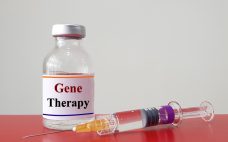Pfizer has stressed the importance of having the right manufacturing capabilities as it looks to be first to market with its gene therapy for Duchenne muscular dystrophy (DMD). Orphan disease DMD is an X-linked disorder caused by mutations in the gene encoding dystrophin, which is needed for muscle membrane stability. The disease affects around 140,000 boys worldwide, 30,000 of which are in the US and Europe. Most of the current treatments do not address the underlying cause, but gene therapies…

Therapeutic Class
Flash drive: French CDMO to scale up viral vector production
Flash Therapeutics has secured a three-year funding deal to help further develop its LentiFlash viral vector tech and to double its manufacturing capacity. The Toulouse, France-based contract development and manufacturing organization (CDMO) has developed its own lentiviral platform, LentiFlash, for use as a delivery vector in vaccinations, regenerative medicine, and gene-editing applications. ‚ÄúLentiFlash technology leads to a transient expression mediated by RNA delivery as lentiviral-based therapies leads to stable expression mediated by DNA delivery,‚ÄĚ a spokesman from the firm told…
Seqirus looks to next-gen mRNA for seasonal flu vaccine
Seqirus says it will look to build large-scale manufacturing capacity to support its self-amplifying messenger RNA (sa-mRNA) ambitions in the seasonal influenza space. Seqirus has long had a leading role in the seasonal influenza space through its portfolio of products, including both egg-based and cell-based vaccine. But now the firm is stepping up its efforts to develop a flu vaccine based on mRNA, launching a dedicated program to support development of its next-generation sa-mRNA platform with plans to set up…
eBook: Cell and Gene Therapies —
A 2021 Industry Update
The US Food and Drug Administration (FDA) reports that as of June 2021, 22 advanced therapy products have received regulatory approval in the United States. The first such product gained regulatory approval in 2010. Since then, hundreds of cell and gene therapies have advanced to clinical evaluation, but few products have reached commercial stages ‚ÄĒ and those that have done so have been hindered by manufacturing problems. In this eBook, writers from the BioProcess Insider and Project Farma analyze trends…
Polyplus reagent aims to ease CGT manufacturing issues
Polyplus has¬†added a reagent to its existing product line developed specifically to enable large-scale viral vector manufacturing. The French-biotech said the reagent has been developed to complement its existing FectoVir-AAV reagent line. ‚ÄúFectoVIR-AAV is a transfection reagent, hence a key component of upstream manufacturing of viral vectors used for gene therapy,‚ÄĚ a spokesperson for Polyplus told BioProcess Insider. ‚ÄúFectoVIR-AAV transports plasmid DNA across the cell membrane. In gene therapy viral vector manufacturing, three plasmids are transfected at the same time…
Podcast: GSK’s digital twin approach to vaccine development
GSK relates its experience of adopting a digital twin technology initiative for its vaccine business on the latest episode of the BioProcess Insider Expression Platform podcast. A digital twin is a virtual representation that serves as the real-time digital counterpart of a physical object or process. Biopharma giant GlaxoSmithKline (GSK) has adopted this technology to advance its vaccine development and manufacturing division. A year after partnering with Siemens and Atos to pilot a digital twin in order to create a…
Second Bluebird gene therapy approval a boon for Minaris
CDMO Minaris says it will be the commercial manufacturer for Skysona (elivaldogene autotemcel, Lenti-D), a second Bluebird Bio gene therapy approved by the European Commission. The European Commission (EC) granted marketing authorization of Skysona for the treatment of early cerebral adrenoleukodystrophy (CALD) yesterday. The one-time gene therapy uses a patient‚Äôs own hematopoietic stem cells (HSC) to treat the underlying cause of the neurologic condition CALD. SKYSONA uses ex vivo transduction with the Lenti-D lentiviral vector (LVV) to add functional copies…
Sanofi doubles down on mRNA vaccines with $475m annual booster shot
‚ÄėThe mRNA story is just beginning‚Äô says Sanofi as it builds on its partnership with Translate Bio by launching dedicated vaccine R&D centers in Massachusetts and France. The French pharma giant announced plans today to invest ‚ā¨400 million ($475 million) annually into what it describes as its ‚ÄėmRNA Center of Excellence‚Äô to accelerate R&D of next-generation vaccines. The ‚ÄėCenter‚Äô will in fact be spread across two of Sanofi‚Äôs locations, Cambridge (Boston) in Massachusetts and in Marcy L‚ÄôEtoile (near Lyon), France,…
$250m CAR-T startup ‚Äėvalidates‚Äô Intellia‚Äôs allogeneic and CRISPR platforms
Intellia Therapeutics, Blackstone, and Cellex have launched a CAR-T biotech aimed at developing chimeric antigen receptor (CAR) T-cell therapies. The new company will combine Intellia‚Äôs allogeneic cell platform and CRISPR cell engineering with Cellex subsidiary GEMoaB‚Äôs switchable universal CAR-T platforms ‚Äď UniCAR and RevCAR ‚Äď to develop a range of therapies against various cancers, including solid tumors. Blackstone Life Sciences has invested $250 million in the new venture, and the three companies ‚Äď Blackstone, Intellia, and Cellex ‚Äď will each…
Vectorized antibody startup VectorY to establish Dutch plant
VectorY Therapeutics will use a portion of its recent ‚ā¨31 ($37) million seed financing to construct a plant in The Netherlands to support its vectorized antibody gene therapy candidates. The biotech, which launched in October 2020 at the Amsterdam Science Park in The Netherlands, secured ‚ā¨31 million through the funding round led by a syndicate that included Forbion, BGV, and Eli Lilly and Company. The money will be used to both establish preclinical proof of the firm‚Äôs concept for vectorized…










